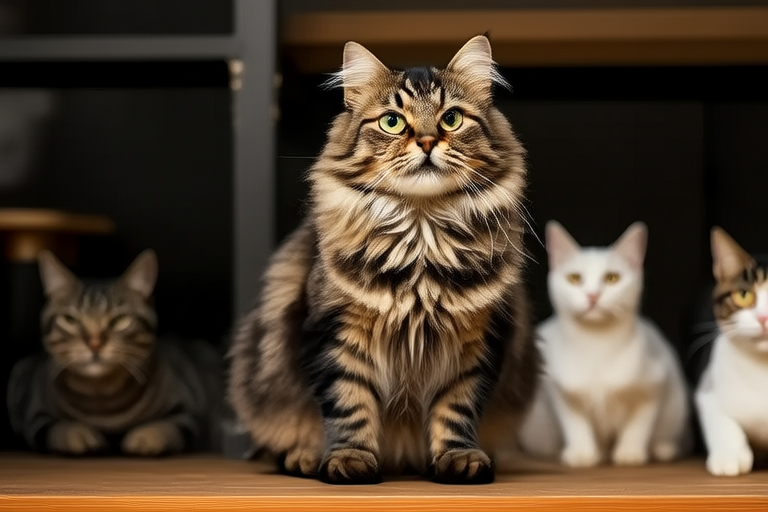Comparing Maine Coons with Other Cat Breeds
Maine Coons are one of the largest domesticated cat breeds, known for their impressive size, friendly demeanor, and striking appearance. They have been cherished for centuries, and their unique characteristics set them apart from other feline breeds. This article aims to provide a detailed comparison between Maine Coons and other popular cat breeds, highlighting the distinctive traits that make Maine Coons a favorite among cat enthusiasts.
Physical Attributes
Maine Coons are easily distinguishable by their robust build and large size. Males can weigh up to 18 pounds, while females tend to be slightly smaller, reaching about 12 pounds. Their muscular bodies are complemented by long, flowing fur, which forms a ruff around their necks and a bushy tail. The coat’s texture is water-resistant, a feature that has been attributed to their origins in harsh New England winters. Their ears are tufted, and their eyes are large and expressive, often in shades of green, gold, or copper.
Compared to other breeds, such as Siamese or Oriental Shorthairs, Maine Coons are notably larger and heavier. These breeds are slender and graceful, with sleek, short coats. In contrast, Maine Coons have a more rugged, almost lion-like appearance. Their thick, shaggy fur requires more grooming than many other breeds, but it also provides insulation against cold weather, making them well-suited for outdoor living.
Temperament
Maine Coons are renowned for their friendly and sociable nature. They are often described as “dog-like” because they enjoy human companionship and may follow their owners around the house. They are patient, gentle, and good with children, making them excellent family pets. Maine Coons are also intelligent and curious, which can lead to playful antics and problem-solving behaviors.
In terms of temperament, Maine Coons differ significantly from breeds like the Siamese, which are known for being more vocal and demanding of attention. While Maine Coons do enjoy interaction, they are generally more laid-back and less likely to become distressed if left alone for short periods. Similarly, compared to Abyssinians, who are energetic and require more mental stimulation, Maine Coons are more relaxed and content with a moderate amount of activity.
Health Considerations
Despite their robust appearance, Maine Coons are prone to certain health issues. One of the most common conditions is hypertrophic cardiomyopathy (HCM), a heart disease that affects the muscle tissue of the heart. Regular veterinary check-ups and genetic testing can help identify and manage this condition early. Another concern is hip dysplasia, a hereditary disorder that affects the hip joint and can cause pain and mobility issues.
When comparing Maine Coons to other breeds, it’s important to note that while some breeds, like the Ragdoll, are generally healthy, they may have different sets of concerns. For example, Ragdolls are susceptible to respiratory infections, whereas Maine Coons face cardiovascular issues. Owners of Maine Coons should be aware of these potential health risks and take proactive measures to ensure their cats’ well-being.
Grooming Needs
Maine Coons require regular grooming due to their long, dense coats. Weekly brushing helps prevent matting and keeps the fur in good condition. During shedding seasons, more frequent grooming may be necessary. Despite their high-maintenance coats, Maine Coons are relatively clean cats and will groom themselves regularly. However, owners should still assist in maintaining their coat’s health and appearance.
Compared to short-haired breeds like the American Shorthair, Maine Coons need more grooming. American Shorthairs have a single-layer coat that sheds less and requires minimal maintenance. On the other hand, long-haired breeds like the Persian or Himalayan also require extensive grooming, but their coats are typically silkier and smoother. Maine Coons’ coats are coarser and thicker, which can make grooming a bit more challenging.
Historical Background
The origin of the Maine Coon is steeped in legend. Some believe they are descendants of cats brought to North America by Vikings, while others suggest they are the result of interbreeding between domestic cats and raccoons. Despite these myths, the true history of the breed remains uncertain. What is known is that they were popular show cats in the late 19th century and nearly disappeared during the early 20th century when other breeds became more fashionable.
Maine Coons are considered one of the oldest natural breeds in North America. They adapted to the harsh climate of New England, developing their distinctive features over time. This resilience and adaptability have contributed to their enduring popularity. In contrast, breeds like the Sphynx, which originated in the mid-20th century, were created through selective breeding rather than natural evolution.
Conclusion
Maine Coons are truly unique among cat breeds, combining impressive physical attributes, a friendly and sociable temperament, and a rich historical background. Their grooming needs and health considerations require attentive care from owners, but the rewards of having a Maine Coon in your life are immeasurable. Whether you’re a first-time cat owner or an experienced enthusiast, understanding the distinct traits of Maine Coons can help you make informed decisions about adopting or caring for one of these magnificent creatures.
By comparing Maine Coons with other breeds, it becomes clear that they offer a special blend of characteristics that appeal to a wide range of pet owners. Their size, intelligence, and affectionate nature make them ideal companions for families and individuals alike. As you consider bringing a Maine Coon into your home, remember that they are not just pets but cherished members of the family, deserving of love, care, and attention.
